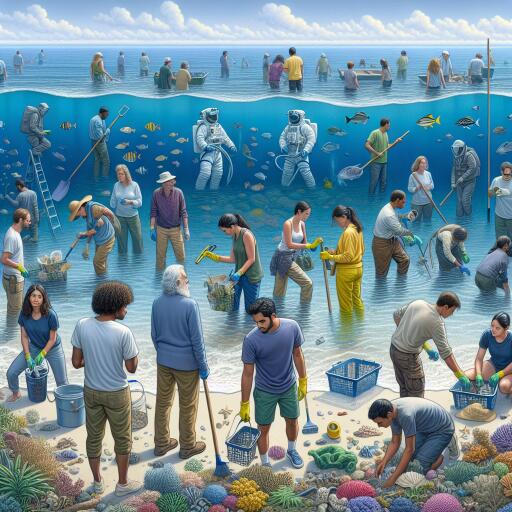
Citizen Science: A Beacon of Hope for Marine Ecosystems
In recent years, the potential of citizen science to revolutionize conservation efforts in marine ecosystems has been increasingly recognized. A collaborative study involving universities and research institutions has unveiled promising outcomes from citizen-led initiatives focused on saving the Mediterranean’s underwater biodiversity, particularly its corals and gorgonians. These efforts not only underscore the value of volunteer contributions to scientific research but also spotlight the growing threat of environmental crises on marine life.
The Mediterranean, with its rich tapestry of more than 1,600 marine species, treasures a coral reef system built by the gradual accumulation of calcareous organisms. This biodiversity hotspot, however, faces the relentless challenge of rising sea temperatures, among other human-induced threats. In response, a project named ‘Atenció Coralls!’ was set in motion under a citizen science platform aiming to train volunteers to monitor the health and distribution of vital coral populations.
Through this initiative, enthusiasts with varying levels of training were tasked with applying a standardized sampling protocol along the Costa Brava. Remarkably, even volunteers with minimal training produced data with precision comparable to that collected by seasoned scientists. These findings highlight the effectiveness of training sessions in enhancing the accuracy of citizen-collected data, reaffirming the invaluable role of public participation in environmental conservation.
The rigor of these data collection methods and the subsequent expert validation process ensured the reliability of findings. Such meticulous attention to detail revealed a disconcerting trend: a notable decline in the health of coral and gorgonian populations within the region, evolving from minimal impact scenarios to conditions of moderate and severe degradation over the years. This pattern mirrors the distress signals echoed across various untouched marine habitats, amplifying the urgency for direct action.
Building on the success and precision of these collaborative efforts, future expeditions dubbed ‘Coralligenous Weekends’ expanded the scope of this research. Enthusiastic participation from volunteers and local diving centers brought to light the impact of heatwaves on extensive gorgonian populations, advancing our understanding of the marine ecosystem’s resilience and vulnerabilities. Collectively, these endeavors underscore the critical need for data on the health of marine species, enabling better-informed conservation strategies.
Beyond the collection of vital data, the project also served as an immersive educational experience for volunteers. Participants shared how the initiative offered a fresh perspective on their marine surroundings, sensitizing them to the ongoing changes beneath the waves. By bridging the gap between scientific research and community involvement, these citizen science programs foster a deeper appreciation and understanding of marine conservation issues.
Amid these findings, the glaring impact of elevated sea temperatures on marine life stands out, with certain coral species suffering devastating losses. The severity of these impacts varies with depth, revealing a complex picture of ecological stress and resilience. These insights are not just academic; they are a clarion call for urgent action and adaptation strategies to safeguard our marine ecosystems.
At its core, the burgeoning field of citizen science embodies a potent tool for ecological conservation, engaging public interest and leveraging collective action for the greater environmental good. Through projects like ‘Atenció Coralls!’, ordinary citizens are not just observers but active participants in the fight against the environmental crisis, contributing to a legacy of knowledge and protection for our most vulnerable marine habitats.





Leave a Reply